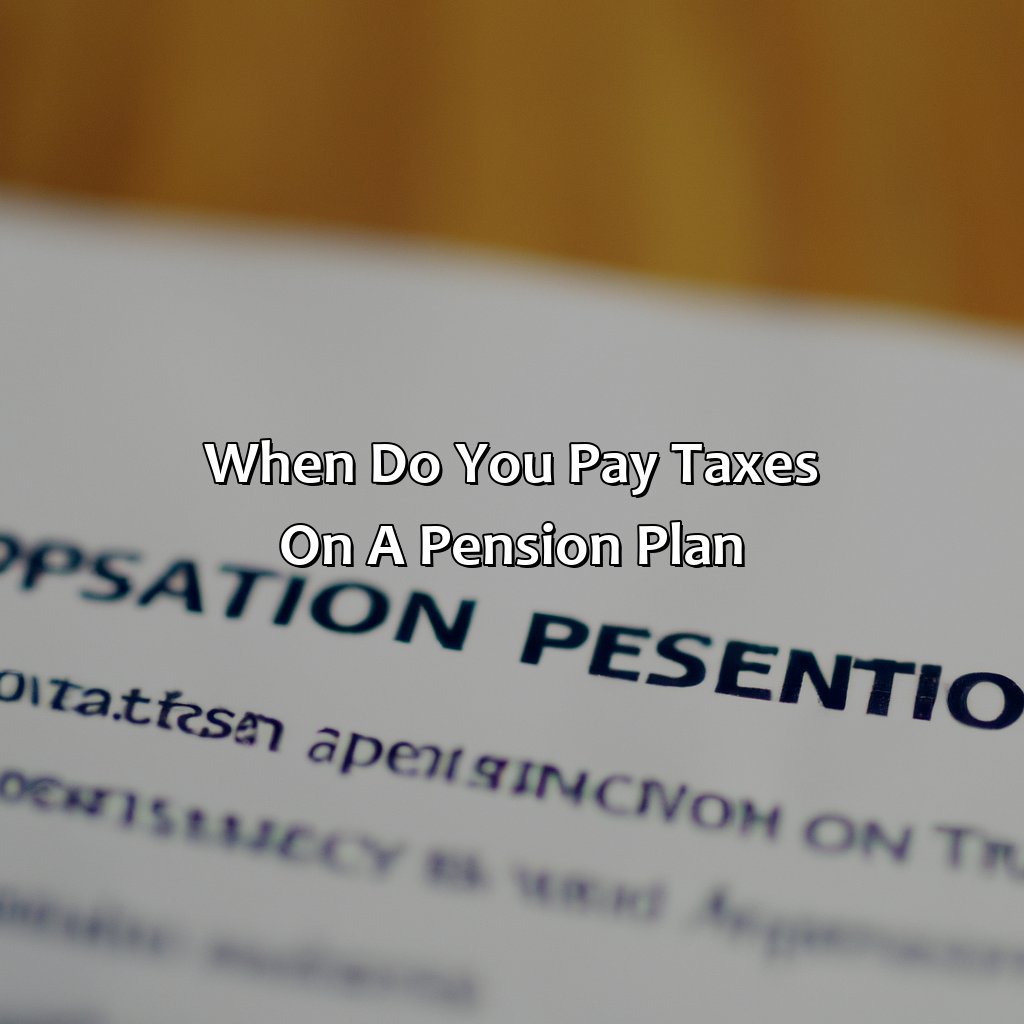When Do You Pay Taxes On A Pension Plan?
Key Takeaway:
- Taxation on Pension Plans varies based on the type of plan and the income received from it. Pension income can be either taxable or non-taxable depending on certain criteria.
- Taxation on Pension Withdrawals also depends on the type of Pension Plan. Traditional Pension Plans require taxes to be paid upon withdrawal, whereas Roth Plans do not require taxes to be paid upon withdrawal.
- Taxation on Pension Payout Options also varies depending on the payout method. Lump Sum Distributions are taxed differently than Annuity Payments. It’s important to understand the tax implications before choosing a payout option.
- Avoiding Tax Penalties is crucial when dealing with Pension Plans. Required Minimum Distributions must be taken in time, and carefully timing withdrawals can reduce tax liability.
- Conclusion: Understanding Taxation on Pension Plans is key to avoiding penalties and minimizing tax liability. Seek advice from a financial advisor to understand your unique situation.
Are you worried about when to pay taxes on your pension plan? Don’t fret, you’re not alone. This article will provide you with all the information you need to know about when taxes are due on your pension. Get ready to maximize your pension plan and stay ahead of the game!
Taxation on Pension Plans
Want to know how to pay taxes for your pension plan? Check out the “Taxation on Pension Plans” section. It has two subsections:
- “Taxable Pension Income”
- “Non-Taxable Pension Income”
These’ll help you figure out the taxation rules for your pension payments.
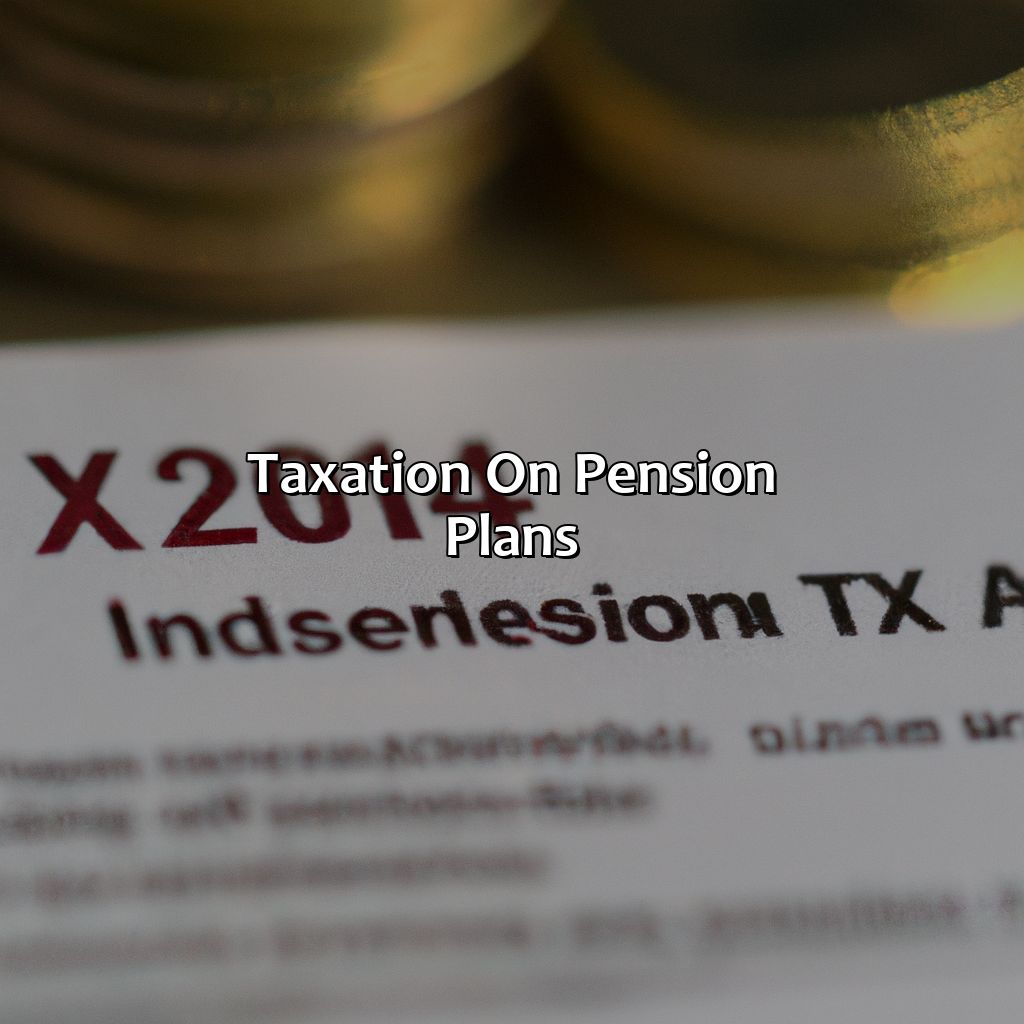
Image credits: retiregenz.com by James Washington
Taxable Pension Income
The Taxation On Retiree’s Income
Retirees who receive pension plan benefits may have to pay taxes on their payments. The amount of tax they will pay depends on several factors such as age, income, marital status and the type of plan from which they are receiving payments. To help you understand the taxation rules on pensions, we have prepared a table below:
| Type of Plan | Tax Considerations |
|---|---|
| Defined Benefit Plan | Fully taxable |
| 401k Plan or 403b Plan | Withdrawals from these plans are subject to income tax. |
| Roth IRA | Contributions to Roth IRA do not reduce your tax liability but they can grow tax-free until retirement. |
It is important to note that if retirees take early distributions (before the age of 59 and a half years old), they could be subject to additional taxes as well as penalties.
Apart from the aforementioned key points, it is essential for retirees to conduct a financial review with their investment advisor annually and recognize how different economic factors will impact their retirement goals.
Make sure you understand how your pension plan is being taxed so you don’t end up paying more than you should in taxes. Don’t miss your chance for proper planning!
To get a better understanding of what a pay as you go pension plan is, it’s important to consult with a financial advisor and educate yourself on the tax implications and benefits of different pension plans.
Get ready to say ‘Bye Bye Bye’ to taxes on your pension plan income with these non-taxable options!
Non-Taxable Pension Income
Retirement plan income that isn’t subject to taxation falls under the category of Non-Taxable Pension Income. The IRS has defined certain types of pension income as non-taxable, such as specific disability pensions or life insurance paid after retirement.
Non-Taxable Pension Income ensures that retirees receive an income that isn’t negatively affected by tax obligations. This can be beneficial for individuals who rely on their pension to maintain their lifestyle in retirement. It’s important to note that not all pension plans are considered non-taxable, and eligibility requirements vary depending on the plan. If you’re curious about how much SSS pension you will get, it’s best to consult with a financial advisor who can provide personalized guidance.
It’s crucial to understand which types of pension income are considered non-taxable and when taxes may still need to be paid on the income received. It is recommended to consult a financial advisor or tax professional for guidance on using non-taxable pension income as part of a comprehensive retirement plan. If you’re wondering how much is the aged pension, you can also seek advice from the same professionals.
Recently, there have been changes in regulations surrounding Non-Taxable Pension Income, including updated eligibility requirements and revised taxation policies. Keeping up-to-date with these changes will ensure that retirees continue receiving the appropriate level of untaxed income they’re entitled to.
“Your pension may be golden, but the taxman’s hands are 24-carat.”
Ruth, a retired teacher, receives non-taxable disability payments alongside her regular pension benefits each month due to an injury she sustained before retiring. The additional funds help her cover medical costs and living expenses while enjoying her retirement without worrying about paying extra taxes on this portion of her earnings.
Taxation on Pension Withdrawals
To get the scoop about taxes on pension withdrawals with traditional and Roth pension plans, you need to recognize when and how to pay. Let’s dig in and clear up any confusion!
Sub-sections ahead:
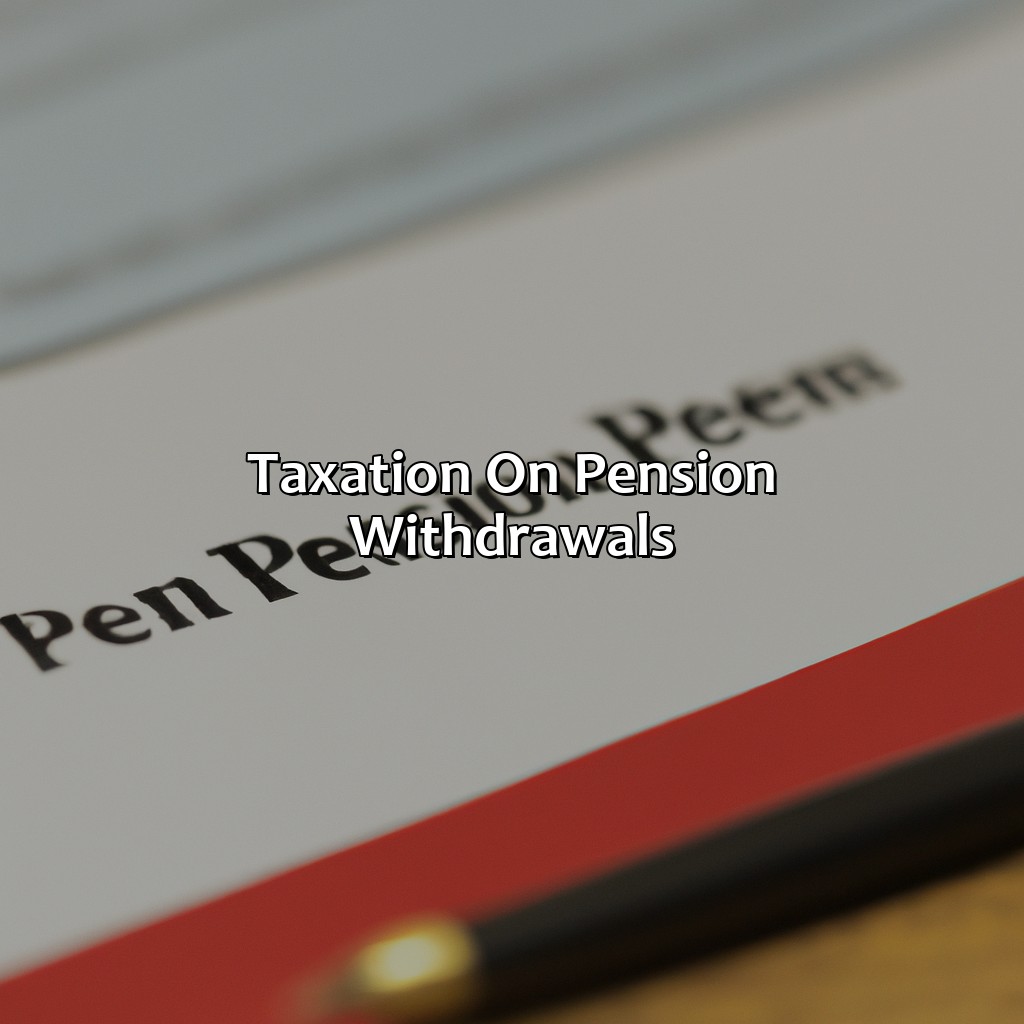
Image credits: retiregenz.com by Joel Arnold
Traditional Pension Plan
Pension Plan Taxes – Understanding When Taxes Are Levied on Drawdowns
Retirement is a stage of life that most people look forward to. To ensure financial security after retirement, one can invest in pension plans. A well-known type of pension fund is the traditional pension plan, which involves contributions from both the employer and employee during employment. After retirement, the employee receives a fixed monthly income for life. Wondering how much Canada Pension Plan you will receive? Find out more!
When it comes to withdrawing funds from a traditional pension plan, taxes are levied on the drawdowns at the time of withdrawal. This means that as and when you withdraw money from your pension plan account, you will be required to pay tax on the amount withdrawn at your marginal rate of tax applicable in that year.
It is important to note that if you want to know how many years you have to work in Canada to get a pension, any withdrawals made before the age of 59½ may result in an additional early withdrawal penalty tax being assessed by IRS apart from applicable federal and state taxes.
Understanding these nuances of taxation when it comes to traditional pension plans can help you make informed decisions about how much money to withdraw every year and optimize your retirement income. Have you heard about pension income splitting in Canada? It can also be a useful strategy to reduce your tax burden.
In history, Pension Plans were initially created for civil servants by Otto Von Bismarck in 1889 in Germany. The idea soon gained traction around the world, helping employees with financial security during their retired years.
Why bother with a Roth Pension Plan when you can just spend all your money on therapy to forget about taxes?
Roth Pension Plan
Roth Retirement Account & Tax Implications
A Roth retirement account is a type of pension plan that allows individuals to contribute after-tax dollars, and withdrawals are tax-free if certain conditions are met. Contributions to the account cannot be deducted on your income taxes, but earnings and qualified withdrawals are tax-free.
Individuals can contribute up to a certain annual limit, depending on their age and income. The contributions made to the Roth account grow tax-free until you withdraw them in retirement or meet other qualifications.
It is important to note that non-qualified withdrawals from a Roth account before the age of 59 1/2 may be subject to taxes and penalties.
According to Forbes, “Taxpayers have the option of converting traditional IRA funds into a Roth IRA.” This offers an opportunity for those who may not qualify due to income restrictions when they first open the account.
In summary, if you are wondering about how to apply for Canada pension, a Roth pension plan is an excellent option for those who want flexibility in their retirement plans. By paying taxes up front, you can save money on your future withdrawals. Converting traditional IRA funds into a Roth IRA may also be of benefit in certain situations.
Why choose between a rock and a hard place when you can choose between a lump sum and annuity? Taxation on pension payout options made simple.
Taxation on Pension Payout Options
Taxes on pensions? Learn when and how much to pay! Two main options: lump sum and annuity payments. We’ll look at the taxes each involves, and how they affect retirement planning.
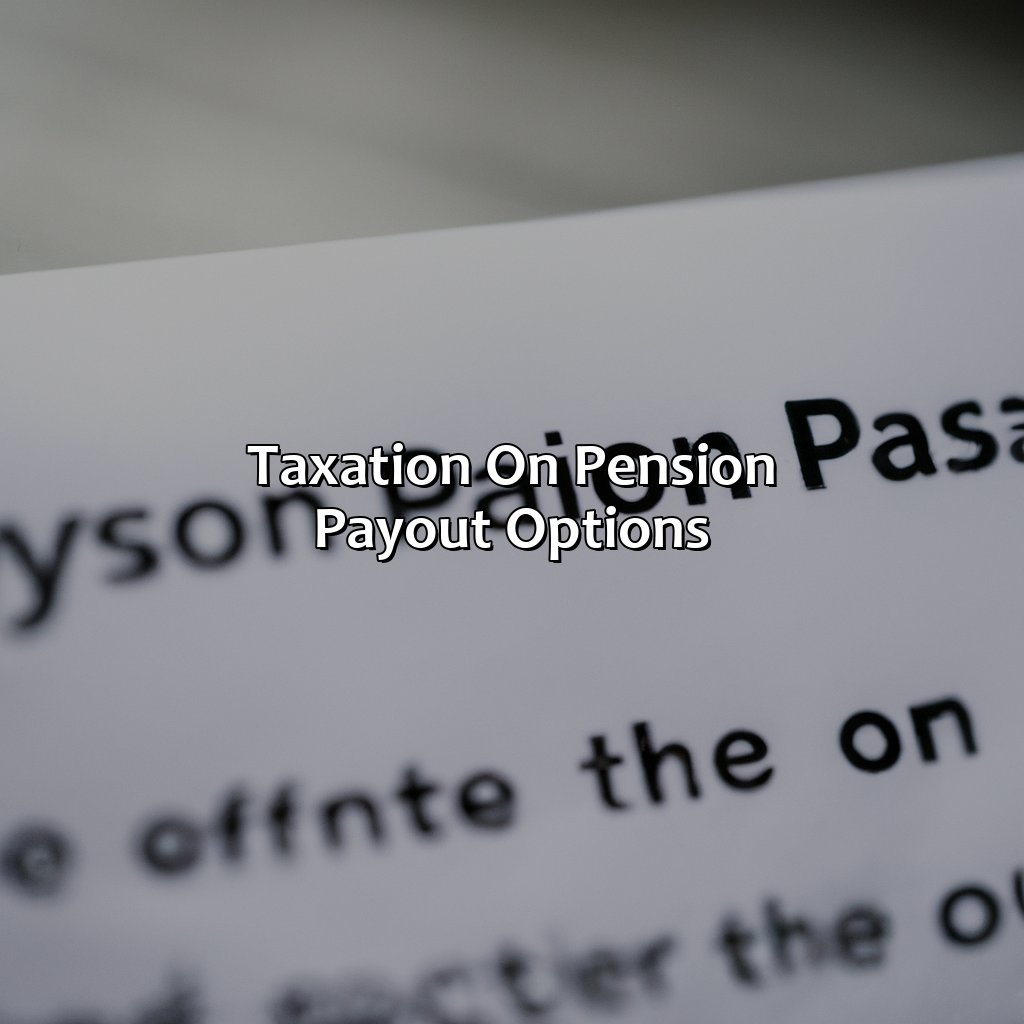
Image credits: retiregenz.com by Yuval Arnold
Lump Sum Distribution
Receiving a one-time payment of your accumulated retirement funds is known as a “Lump Sum Distribution”. This type of payment involves receiving the whole sum at once, instead of receiving it in installments. Lump sums can vary based on each pension plan and may be subject to taxes before or after the distribution.
A lump sum distribution can be taxed differently than receiving the payments over time. A lump sum payment will either have taxes withheld or it can be rolled over into an IRA account that allows for more flexibility in controlling taxes and realizing investment gains. The taxable portion of this payout comes from any growth accumulated within the account since you made contributions into it.
It’s essential to keep in mind that penalties might apply if you take the lump sum before reaching age 59 . Early distributions are considered taxable income by both state and federal governments, which means they’re subject to income tax, and an additional ten percent penalty tax applies.
Considering that there may be tax implications associated with your pension plan distribution option, consulting an attorney or financial advisor is always recommended. If you’re wondering how much tax you’ll pay on your pension, it’s best to seek professional advice.
While taking a lump sum distribution might seem like an easy solution to access your retirement funds all at once, it’s essential to do so strategically because of its tax implications. It’s essential always to work with experts who help create realistic and effective plans that consider unique circumstances and goals holistically when planning accordingly.
Annuity payments are like the gift that keeps on giving…to the government.
Annuity Payments
Payments received from a fixed sum of money, paid at regular intervals throughout the retired life, is an investment product known as annuity. The amount of taxable income depends on how you fund the annuity and when you start taking payouts.
The only thing worse than paying taxes on your pension payout is paying even more in tax penalties for not following the rules.
Avoiding Tax Penalties
Strategize to avoid tax penalties on your pension plan! Look into Required Minimum Distributions and Timing of Withdrawals. This will help you plan how to withdraw money from your pension plan. It will also minimize potential tax penalties.
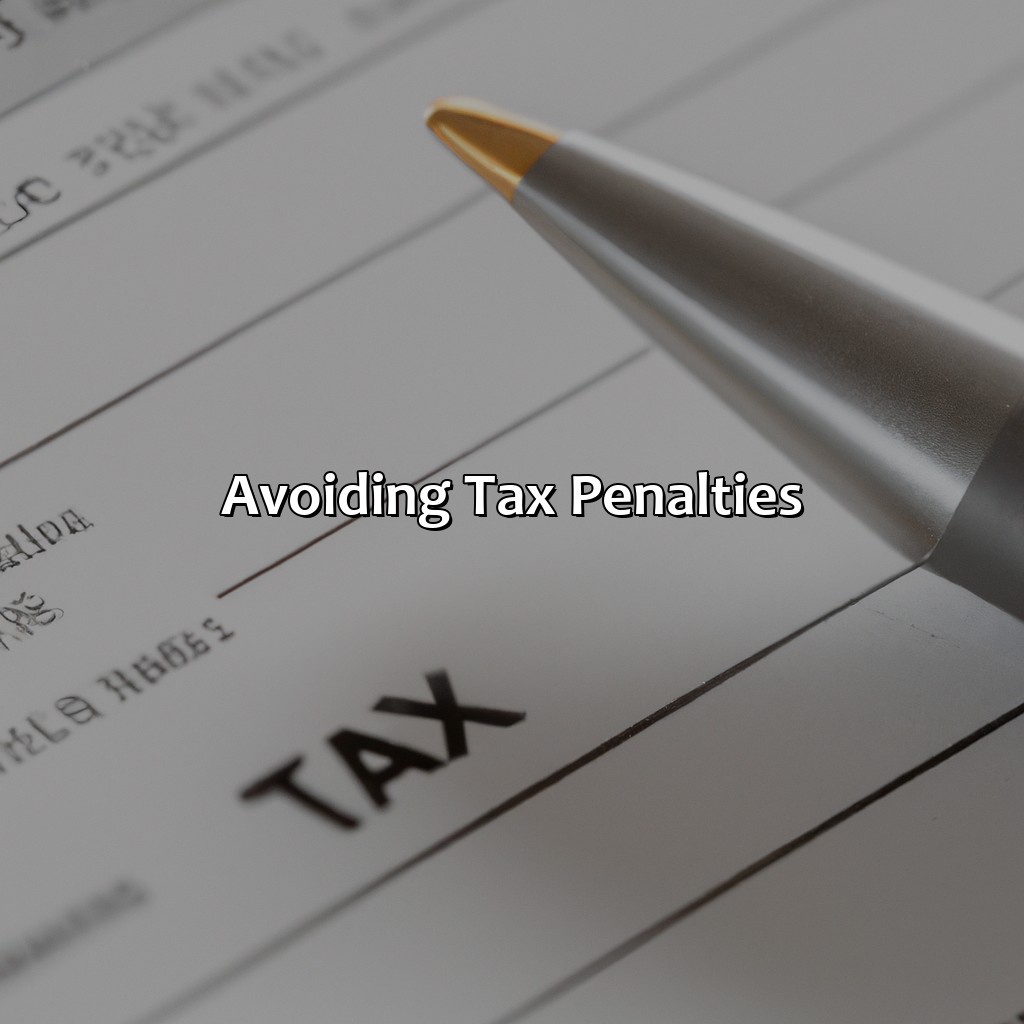
Image credits: retiregenz.com by Harry Arnold
Required Minimum Distributions
Once you reach the age of 72, the IRS mandates that you withdraw a certain amount from your retirement accounts each year. This is known as the Distribution Age and is crucial in avoiding tax penalties.
These Required Minimum Distributions (RMDs) are calculated based on the account balance at the end of the previous year and your life expectancy. If you’re wondering how much does pension advice cost, it’s important to know that failing to withdraw the correct amount can result in a hefty penalty of up to 50% of the RMD.
To avoid this, it’s essential to plan ahead and ensure that you take out at least the required minimum each year. You may also choose to withdraw more than what is required or consider converting a traditional IRA into a Roth IRA, which has different distribution rules.
With proper planning and attention to detail, navigating RMDs can be less daunting and more manageable for retirees. Meeting your required minimum distributions on time can save you from costly tax penalties in retirement. Better late than never, unless you’re withdrawing from your pension plan and facing tax penalties.
Timing of withdrawals
Withdrawals from a pension plan can be a complicated matter when it comes to tax penalties. The timing of these withdrawals is crucial in avoiding such penalties. It is essential to have an understanding of the rules and regulations surrounding your pension plan to ensure you time your withdrawals correctly.
One of the critical factors in timing your withdrawals is your age. This is because different rules apply for those who are below or above 59½ years old. For those who are below this age, withdrawing funds earlier than this can lead to early withdrawal penalties. However, for those above this age, withdrawals must begin by April 1st of the year following the year you turn 72.
It’s vital to know that waiting too long to make withdrawals can also incur penalties. Therefore, it’s best to plan out how much and when you’ll withdraw according to your needs and retirement goals. Calculating Required Minimum Distributions (RMDs) may help with this planning process.
Pro Tip: Seek guidance from a financial advisor who specializes in pensions and retirement planning as they’ll be able to provide customized advice based on your specific situation.
Five Facts About When Do You Pay Taxes on a Pension Plan:
You pay taxes on your pension plan when you withdraw the money. (Source: IRS)
The amount of taxes owed on a pension plan depends on your tax bracket and the type of plan you have. (Source: Investopedia)
Some pension plans may allow for tax-free withdrawals if certain conditions are met. (Source: The Balance)
If you roll over your pension plan into an IRA, you may be able to defer taxes until you begin making withdrawals from the IRA. (Source: Nolo)
It’s important to plan for taxes on your pension plan to avoid unexpected tax bills and penalties. (Source: AARP)
FAQs about When Do You Pay Taxes On A Pension Plan?
When do you pay taxes on a pension plan?
When you receive distributions (withdrawals) from your pension plan, you will generally owe taxes on the amount you receive. The timing of when you pay these taxes will depend on the type of pension plan you have and the rules governing it.
Do you pay taxes on a pension plan while you are still working?
No, you generally do not pay taxes on pension plan contributions or earnings while you are still working and contributing to the plan. You will only owe taxes when you receive distributions (withdrawals) from the plan.
What tax rate do you pay on pension plan distributions?
The tax rate you pay on pension plan distributions will depend on your overall income level and tax bracket. Pension plan distributions are generally considered taxable income and are subject to federal and state income taxes.
Can you roll over pension plan distributions to avoid paying taxes?
Yes, in some cases you may be able to roll over your pension plan distributions into another qualified retirement account, such as an IRA or another employer-sponsored retirement plan. This can allow you to avoid paying taxes on the distribution, as long as you follow the specific rules and guidelines governing such rollovers.
What happens if you don’t pay taxes on pension plan distributions?
If you fail to pay taxes on pension plan distributions, you may be subject to penalties, interest, and other fees from the IRS and/or your state tax agency. You may also face legal consequences if you knowingly fail to report and pay taxes on your pension plan income.
Are there any exceptions to paying taxes on pension plan distributions?
There may be certain exceptions or special circumstances where you do not have to pay taxes on pension plan distributions, such as if the funds are used for qualified medical expenses or if you are a military veteran receiving disability benefits. It is important to consult with a tax professional or financial advisor to understand your specific situation and any applicable tax rules and regulations.
 Checkout this IRS Loophole
Checkout this IRS Loophole 
